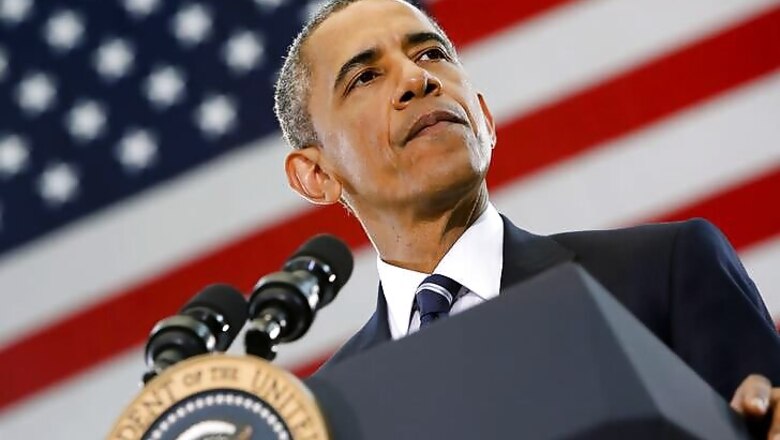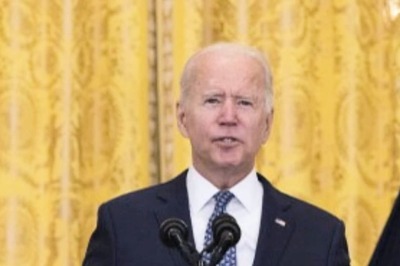
views
Washington: President Barack Obama, seeking to sell the Iran nuclear deal to skeptical U.S. lawmakers and nervous allies, insisted on Wednesday the landmark agreement was the only alternative to a nuclear arms race and more war in the Middle East.
Obama made his case in a nationally televised news conference responding to critics at home and abroad after Iran and six world powers sealed an accord in Vienna on Tuesday to restrict Tehran’s nuclear programme in exchange for sanctions relief.
"Without a deal,” Obama said, “there would be no limits to Iran’s nuclear programme and Iran could move closer to a nuclear bomb ... Without a deal, we risk even more war in the Middle East.”
Obama, who must still overcome a congressional hurdle to enact the accord, said that if the United States does not seize the opportunity, “future generations will judge us harshly.”
The agreement is a triumph for Obama, who has made outreach to America’s enemies a hallmark of his presidency, but it is also seen as his biggest foreign policy gamble since taking office in 2009.
In his first public comment, Iran's Supreme Leader, Ayatollah Ali Khamenei, said the deal should be scrutinized and legal procedures taken so the other side does not breach it.
In a letter to Iranian President Hassan Rouhani, Khamenei - whose ultimate backing was critical to securing the agreement - said some of the powers involved in the negotiations "are not trustworthy."
Obama is now spearheading an intense White House push to counter Republican critics in Congress and reassure jittery allies such as Israel and Saudi Arabia.
He sent Vice President Joe Biden to Capitol Hill on Wednesday to corral fellow Democrats who might be wavering. Defence Secretary Ash Carter will travel next week to Israel and Saudi Arabia.
Critics say the deal contains loopholes, especially in inspection procedures that Iran could exploit, and will provide Tehran with an infusion of unfrozen assets to fund its proxies in sectarian conflicts from Syria to Iraq to Yemen.
LAWYERLY APPROACH
At Wednesday's news conference, Obama spoke in a lawyerly tone, at times mocking opponents of the deal, including Israeli Prime Minister Benjamin Netanyahu, for offering no viable alternative. He dismissed critics' objections one by one and even solicited others from journalists.
Obama contended the deal was sound and that a "snap-back" mechanism in it to restore sanctions if Iran cheated would ensure Tehran faced real consequences.
But he acknowledged that although he hopes the deal will encourage Iran to rein in its aggressive conduct in the region, he was not betting on a change.
Obama said without a deal other countries in the Middle East would feel compelled to pursue their own nuclear arms programs.
"There really are only two alternatives here," he said, citing diplomacy or war, an appeal to war-weary Americans to back a negotiated settlement with Iran.
Under the agreement, sanctions imposed by the United States, the European Union and the United Nations will be lifted in return for Iran agreeing long-term curbs on a nuclear programme that the West has suspected was aimed at creating a nuclear bomb. Iran says the programme is peaceful.
Obama has run into a storm of accusations from Republican lawmakers and Israel that he gave away too much toTehran.
Obama has vowed to veto any effort to block the deal and although he faces a tough challenge in the Republican-controlled Congress, he is expected to prevail.
He said he does not anticipate Republicans in Congress will rally around the pact but said that if lawmakers vote based on the facts, the majority should approve it.
The agreement, the biggest step toward rapprochement between Iran and the West since the 1979 Islamic Revolution, is a legacy-defining achievement for Obama as well as his best hope for salvaging an otherwise shaky Middle East record.
Netanyahu cried foul, however, convinced the deal will do little to curb Tehran's nuclear ambitions and leave Israel under greater threat.
His nuclear affairs minister said Israel was like the boy in the fairy tale who pointed out the emperor had no clothes, and emphasized Israel's right to unilateral self-defence.
“Israel is like the little child that is pointing its finger and saying, 'the king is naked, this agreement is naked'," said Yuval Steinitz.
Obama said Israel, widely assumed to be the Middle East's only nuclear-armed state, had legitimate security concerns but insisted that danger would be compounded if Iran acquired a nuclear weapon.
Obama's national security adviser, Susan Rice said that Washington would look at ways to deepen its security cooperation with Israel.
"We will ... be looking forward, if the Israelis are interested and willing - they haven't said so yet - to discuss with them how we might further deepen and strengthen our security and intelligence cooperation," she said.
Congress will have 60 days to review the agreement. Republicans would need the support of dozens of Democrats to sustain a "resolution of disapproval" that could cripple a deal. But the odds are slim that they could muster enough support to overrule an Obama veto.



















Comments
0 comment